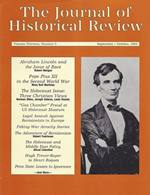Letters
Defining Moment Just a note to express appreciation for the improved quality of the Journal. At first I did not like the shift from an academic to a magazine format, and I think I detected some grinding of gears in the change-over. But the July/August issue is a real success. I enjoyed the tantalizing selection…

